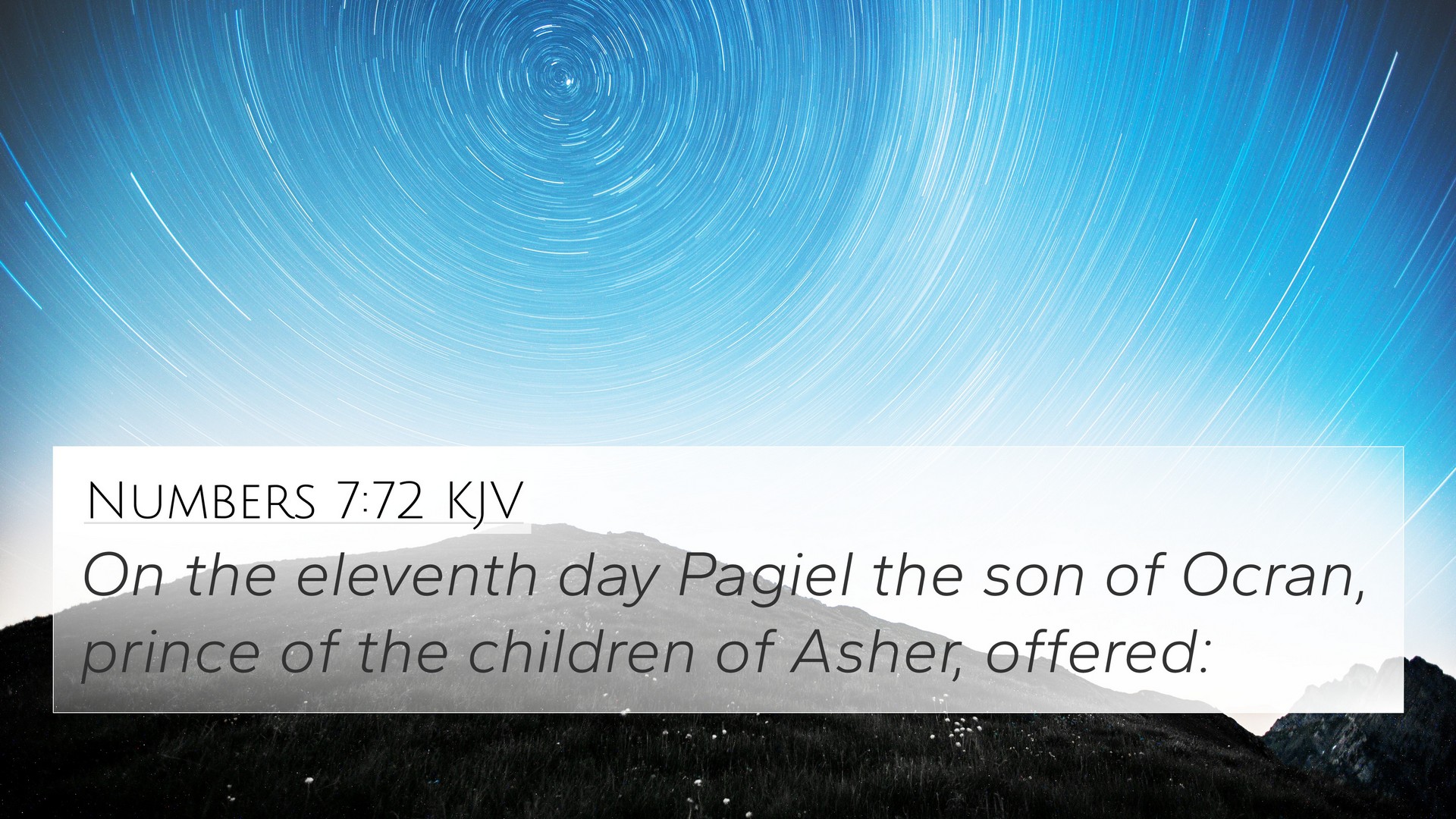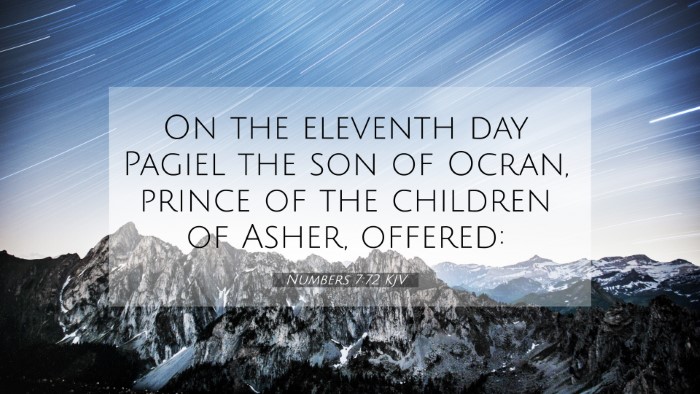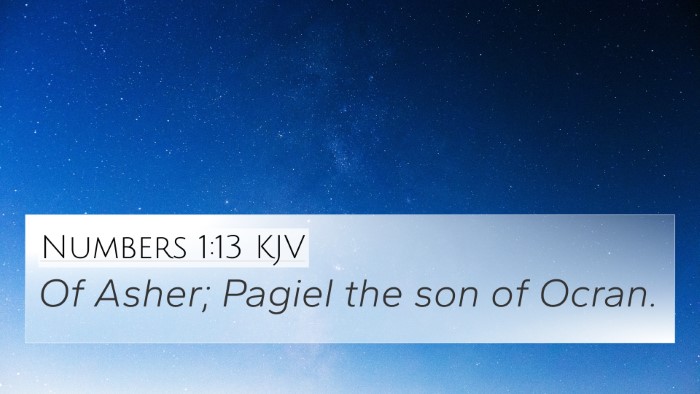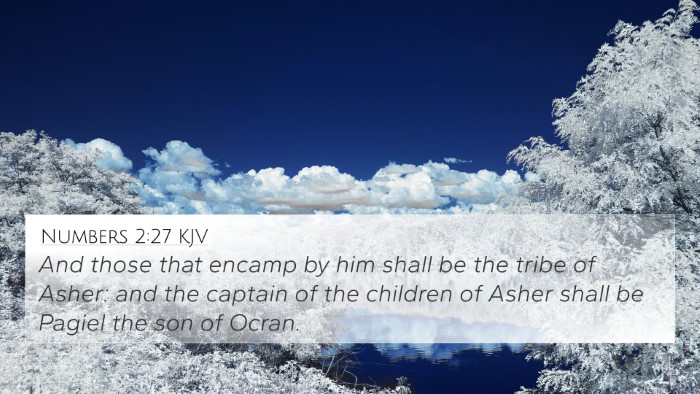Understanding Numbers 7:72
Numbers 7:72 describes the offerings made by the tribe of Naphtali during the dedication of the tabernacle. The verse reads:
"On the tenth day Ahira the son of Enan, prince of the children of Naphtali, offered." (Numbers 7:72)
Meaning and Insights from Commentaries
In dissecting this verse, several public domain commentaries provide valuable insights that enrich our understanding. Below are thoughts derived from renowned commentators:
-
Matthew Henry:
Henry emphasizes the significance of the orderly and systematic approach to offerings presented by each tribe, reinforcing the importance of unity and participation in worship. The detail in naming Ahira shows God’s personal acknowledgment of each leader's contribution to communal worship.
-
Albert Barnes:
Barnes elaborates on the symbolism of the offerings, which represented dedication and full commitment to God. He draws attention to how each tribe's presentation underlines Israel's collective identity and reliance on divine guidance.
-
Adam Clarke:
Clarke notes that this expression of the tribe's offerings not only illustrates their devotion but also signifies the blessings associated with obedience. He suggests that these acts of worship are pivotal in the covenant relationship between God and His people.
Cross-References and Thematic Connections
Numbers 7:72 is interconnected with various other scripture passages, showcasing the unity of the biblical narrative and the themes of dedication, sacrifice, and covenantal relationship. Here are some key verses that relate:
- Leviticus 23:37: "These are the feasts of the Lord, which ye shall proclaim to be holy convocations, to offer an offering made by fire unto the Lord." This highlights the necessity of offerings in worship.
- Exodus 25:2: "Speak unto the children of Israel, that they bring me an offering: of every man that giveth it willingly with his heart ye shall take my offering." This verse underlines the voluntary aspect of offerings.
- Psalms 50:14: "Offer unto God thanksgiving; and pay thy vows unto the most High." This speaks to the attitude with which offerings should be given.
- 2 Corinthians 9:7: "Every man according as he purposeth in his heart, so let him give; not grudgingly, or of necessity: for God loveth a cheerful giver." This New Testament principle connects to the spirit behind the offerings in Numbers.
- Hebrews 11:4: "By faith Abel offered unto God a more excellent sacrifice than Cain." This alludes to the foundational importance of sacrifice within scriptural narratives.
- Matthew 5:24: "Leave there thy gift before the altar, and go thy way; first be reconciled to thy brother..." This reminds us of the relational aspect of offerings.
- Romans 12:1: "I beseech you therefore, brethren, by the mercies of God, that ye present your bodies a living sacrifice, holy, acceptable unto God..." This verse connects the concept of offerings to a broader Christian life of commitment and dedication.
The Significance of Order and Participation
The act of bringing offerings in an organized manner—as seen in the episodes of each tribe's presentation—underscores the unity within Israel and foreshadows the New Testament's emphasis on the body of Christ working together for God's glory.
Tools for Bible Cross-Referencing
For those seeking to delve deeper into the connections between scripture, various tools can assist in comprehensive study:
- Bible Concordance: Useful for quickly locating verses related to a particular word or theme.
- Bible Cross-Reference Guide: These guides offer thematic connections highlighting how verses support each other.
- Cross-Reference Bible Study: Methods to compare verses from different books or themes considered in tandem.
Concluding Thoughts
Numbers 7:72 not only reflects the individualized contribution of the tribe of Naphtali but also serves as an exemplar of the broader principles of worship, sacrifice, and covenant within the Biblical narrative. Through cross-referencing with other scriptures, we uncover deeper insights and a more profound understanding of the interconnectedness of God’s Word.
Further Studies in Cross-Referencing
For those interested in how to find cross-references in the Bible or identify connections between the Old and New Testament, engaging in a comparative study of the Pauline epistles or the links between the Prophets and Apostolic teachings can yield enriched understanding and personal growth in faith.




